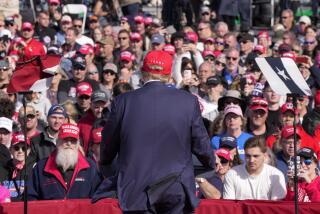View of Journalists--Once Burned, Twice Shy
- Share via
Journalists said Friday that the Reagan Administration’s reported attempt to deceive reporters as part of a disinformation campaign against Libyan leader Moammar Kadafi was unique among government attempts at press deception and may hurt the Administration’s credibility.
“Can’t you see (ABC-TV White House correspondent) Sam Donaldson getting up at the next press conference and asking the President, ‘Is this real information or disinformation?’ ” said Washington Post Executive Editor Benjamin C. Bradlee. “I can.”
This was the reaction to disclosures that the Administration had launched in August a secret campaign of deception to frighten Kadafi, in part by planting stories in the American media.
According to a story in the Washington Post, national security adviser John M. Poindexter had outlined the “disinformation” campaign in a three-page memo, which was later sent to President Reagan. Later, much of the “false information generated by the new plan” appeared as fact in the Wall Street Journal and then in other newspapers.
The Journal’s Washington bureau chief, Albert Hunt, confirmed that his reporters “are going to be a little bit less trusting of some people in this Administration from now on.”
Hunt said he believes much of what his paper reported about Libya on Aug. 25 is accurate, but what his newspaper was told about the planned American response was not. “At least some high level Administration officials misled us or deceived us,” Hunt said.
Too High to Be Ignorant
Those officials, Hunt said, were too high-ranking to have been ignorant of the policy reportedly outlined in the Poindexter memo. Hunt said his reporters have gone back to their sources in the last two days, and some of the sources continue to stand by their remarks.
Eugene L. Roberts, executive editor of the Philadelphia Inquirer, said the alleged deception campaign could harm the Administration’s relations with the press because it was “certainly the most pronounced incident” of deception of the Reagan presidency.
“Every President has lied and misled the people at one time or another. It is in the nature of the beast,” said David Wise, an author who has written extensively about national security.
But some journalists find the current episode particularly objectionable because “this is a well-plotted, well-planned, well-concerted effort to disinform, stamped at the highest level, by the President,” said Howard Simons, curator of the Nieman Foundation at Harvard and former managing editor of the Washington Post. “That makes an enormous difference.”
There have been other cases in which Presidents engaged in deceit.
President Lyndon B. Johnson’s national security adviser, McGeorge Bundy, wrote in a memo in 1965 that the President wanted the public deceived about his intentions when the United States first sent combat Marines to Vietnam, according to Wise’s book, “The Politics of Lying: Government Deception, Secrecy and Power.”
President Richard M. Nixon’s Administration went to elaborate lengths to deceive the press and public about its covert bombing raids in Cambodia.
Screened Military Actions
However, most previous cases of organized governmental deception of the public were stories designed to cover up some other action, often military.
For instance, President Jimmy Carter’s Administration concocted a phony cover story about plans to mine Iranian harbors, Carter Press Secretary Jody Powell said Friday. It intended to use the cover story if word leaked out about preparations for the ultimately unsuccessful attempt to rescue American hostages in Tehran.
The current allegations of deceit are different in that they were an attempt to float wholly inaccurate information intended to create events--the destabilization and possible overthrow of Kadafi--rather than merely to cover them up.
“This was the first time I’m aware of that the government concocted an entire story to sell to the press,” said William F. Thomas, editor and executive vice president of The Times.
Powell, for one, believes that if the Reagan Administration indeed did conduct a disinformation campaign through the American press, something it still denies, the press bears some responsibility for it.
“This is a natural culmination of a process that has been building over the last several years in which journalists have been too content to let the Administration finagle them,” Powell said.
The ultimate effect of the disinformation campaign could be positive, others say. “It has been a big thing in recent years to criticize the press for being too skeptical,” said Roberts. “I say this is a prime example of why we should always be eternally skeptical and unrelenting in our questioning of government.”
More to Read
Sign up for Essential California
The most important California stories and recommendations in your inbox every morning.
You may occasionally receive promotional content from the Los Angeles Times.












